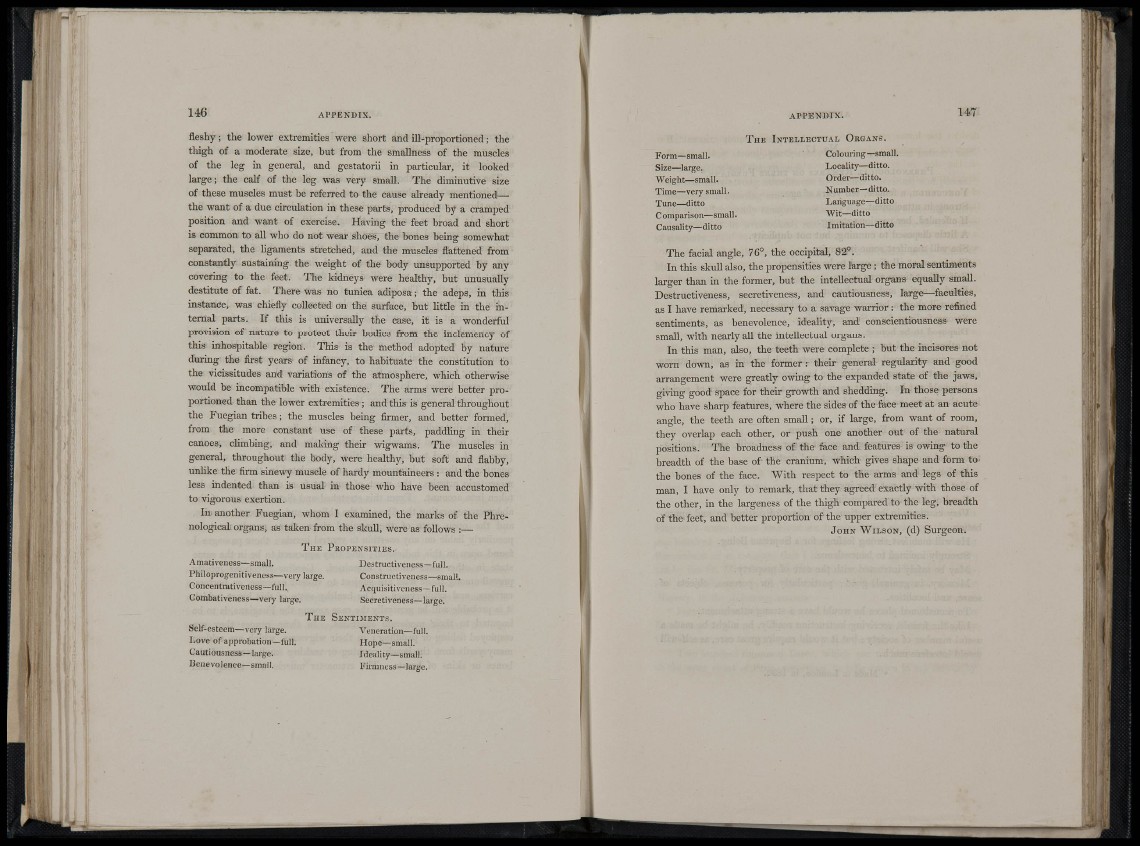
V i -
iií
I • • í
• i
i : '
J
i ;: '
15 I 'i'.'
t
1 '..f'
f!t: «ir ;
1 4 6 AP P ENDIX.
fleshy; the lower exti'emities were short and ill-proportioned; the
tliigh of a moderate size, hut from the smallness of the muscles
of the leg in genersd, and gestatorü in particular, it looked
large; the calf of the leg was very small. The diminutive size
of these muscles must he referred to the cause already mentioned—
the want of a due circulation in these parts, produced by a cramped
position and want of exercise. Havmg the feet broad and short
is common to all who do not wear shoes, the bones being somewhat
separated, the ligaments stretched, and the muscles flattened from
constantly sustaining the weight of the body unsupported by any
covering to the feet. The Iddneys were healthy, but unusually
destitute of fat. There was no tunica adiposa; the adeps, in this
instance, was chiefly collected on the surface, but Httle in the internal
parts. If this is universally the case, it is a wonderful
provision of nature to protect their bodies from the inclemency of
this inhospitable region. This is the method adopted by nature
during the first years of infancy, to habituate the constitution to
the vicissitudes and variations of the atmosphere, which otherwise
would be incompatible with existence. The arms were better proportioned
than the lower extremities; and this is general throughout
the Fuegian tribes; the muscles being firmer, and better formed,
from the more constant use of these parts, paddhng in their
canoes, chmbing, and making their wigsvams. ITie muscles in
general, throughout the body, were healthy, but soft and flabby,
unlike the firm sinewy muscle of hardy mountaineers : and the bones
less indented than is usual in those who have been accustomed
to vigorous exertion.
In another Fuegian, whom I examined, the marks of the Phrenologicali
organs, as taken from the skuU, were as follows :—
T H E
Amativeness—smalt.
Philoprogenitiveness—very large.
Coiicentrativeiless—full.
Combativeness—very large.
Self-esteem—very large.
Love of a]jprobatiori—full.
Cautiousness—large.
Benevojence—small.
T H E
P S O P E N S I T I E S .
Destructiveiiess—full.
Constructiveness—small.
Acquisitiveness—full.
Secretiveness—large.
S E N T I M E N T S .
Veneration—full.
Hope—small.
Ideality—small.
Firmness—large.
APPEXDIX. 147
Form—small.
Size—large.
Weight—small.
Time—very small.
Tune—ditto
C omparison—small,
Causality—ditto
T H E INTELLECTUAL OHGANS.
Colouring—small.
Locality—ditto.
Order—ditto.
Number—ditto.
Language—ditto
Wit—ditto
Imitation—ditto
The facial angle, 76°, the occipital, 82°.
In this skull also, the propensities were large ; the moral sentiments
larger than in the former, but the intellectual organs equally small.
Destructiveness, secretiveness, and cautiousness, large—^faculties,
as I have remarked, necessary to a savage warrior : the more refined
sentiments, as benevolence, ideality, and conscientiousness were
small, with nearly all the intellectual organs.
In this man, also, the teeth were complete ; but the incisores not
worn down, as in the former : their general regularity and good
arrangement were greatly owing to the expanded state of the jaws,
giving good space for their growth and shedding. In those persons
who have sharp features, where the sides of the face meet at an acute
angle, the teeth are often small ; or, if large, from want of room,
they overlap each other, or push one another out of the natural
positions. The broadness of the face and features is owing to the
breadth of the base of the cranium, which gives shape and form tO'
the bones of the face. With respect to the arms and legs of this
man, I have only to remark, that they agreed exactly with those of
the other, in the largeness of the thigh compared to the leg, breadth
of the feet, and better proportion of the upper extremities.
J O H N WILSON, (d) Surgeon. 1